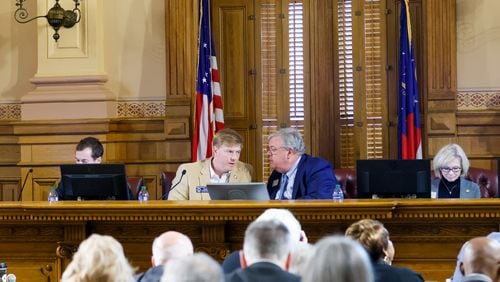The General Assembly waited until late Thursday on the final night of the 2024 session to approve a $36.1 billion state spending plan for the coming year that includes raises for 300,000 educators and state workers, plus more money for law enforcement, education and mental health programs.
The raises are included in the spending plan for fiscal 2025 — which begins July 1. It was approved by the House 175-1 and the Senate 54-1.
State tax collections have been slow for the past year. But the state is sitting on $16 billion in “rainy day” and undesignated reserves, so Gov. Brian Kemp and lawmakers have backed higher spending since the session began in January.
State spending has grown from about $26.6 billion in fiscal 2020, the last budget plan approved before the COVID-19 pandemic hit, as tax collections flowed in during the economic uptick that followed. Revenue stalled out in fiscal 2024, and it is not expected to gain much momentum next year.
All that matters because the money the state collects in taxes helps pay for K-12 schools, colleges, public health care, prisons, policing, business regulation, roads and a host of other services.
“We’re doing a lot of great things for this state (in the budget),” House Appropriations Chairman Matt Hatchett, R-Dublin, said before signing the agreement. “The budget reflects a good picture of our state and where we are.”
Under the Kemp budget plan endorsed by House and Senate leaders, rank-and-file workers would receive 4% increases — up to $3,000 — and teachers would get $2,500 more.
Some other employees, such as those in state law enforcement, would get the 4% raises plus an extra $3,000.
Top state judges had requested extra money for big pay raises. The judges will get the same raises as other state employees next year. However, in mid-2025, Court of Appeals justices would see their salaries go from $184,990 to $212,230 and Supreme Court justices from $186,112 a year to $223,400, officials said.
More than $200 million extra would go to school districts to pay for transporting children to school, something local officials have requested for years, and more than $100 million would go to schools for security upgrades.
Both chambers backed hundreds of millions of dollars more for Medicaid, the state-federal health care program for the poor and disabled, including big money to increase payments to some medical providers.
Kemp made a last-minute addition Wednesday, increasing the state revenue estimate by $48.4 million to put more money into the state’s prekindergarten program to lower class sizes, increase teacher pay, and fund capital and operational projects.
Lawmakers added $10.7 million more for security technology to block cellphone signals in state prisons. Lawmakers began funding that program earlier this year in the midyear budget in hopes of stopping rampant inmate cellphone use.
They also included an extra $6 million to provide more literacy coaches in low-performing schools and $6.3 million for reduced-priced school breakfasts and lunches for students. In addition, lawmakers included millions more for domestic violence and sexual assault centers.
The budget now goes to Kemp for his consideration.
About the Author








